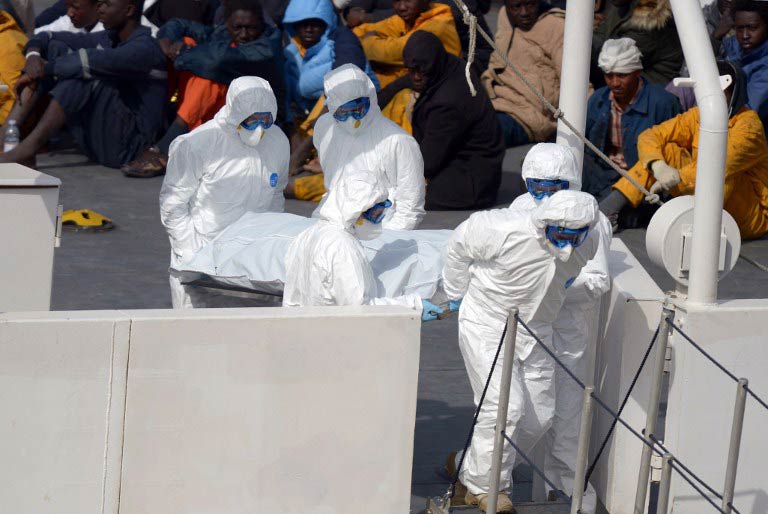
A major rescue operation is under way in the Mediterranean after as many as 700 migrants are feared to have drowned just outside Libyan waters, in what could prove to be the worst disaster yet involving migrants being smuggled to Europe.
Italian coastguards have retrieved 49 survivors so far and about 20 bodies, according to the interior ministry, after the boat went down overnight about 60 miles (96km) off the Libyan coast and 120 miles (193km) south of the Italian island of Lampedusa.
The UN’s refugee agency, UNHCR, told the Guardian that up to 700 may remain in the water, according to numbers supplied by a survivor. The accident happened after the migrants saw a merchant ship in the distance and scrambled to attract its attention, over-balancing the fishing boat in which they were travelling.
Barbara Molinario, a spokeswoman for UNHCR in Rome, said: “They wanted to be rescued. They saw another ship. They were trying to make themselves known to it.”
If confirmed, Sunday morning’s accident means that at least 1 500 migrants have died so far in 2015 while on route to Europe – at least 30 times higher than last year’s equivalent figure, which was itself a record. It comes just days after 400 others drowned last week in a similar incident.
The deaths prompted fresh calls for Europe to reinstate full-scale search-and-rescue operations in the Mediterranean. Last October, the EU opted not to replace the Italian-run operation Mare Nostrum, which saved about 100 000 lives last year, amid fears that it was encouraging smugglers and migrants to organise more trips to Europe.
Pope Francis, an outspoken advocate for greater European-wide participation in rescue efforts, reiterated his call for action during mass on Sunday after learning of the latest disaster.
“They are men and women like us – our brothers seeking a better life, starving, persecuted, wounded, exploited, victims of war,” he said from St Peter’s Square.
Save the Children, one of the primary aid agencies working with migrants arriving in Italy, called on EU leaders to hold crisis talks in the next 48 hours and to resume search-and-rescue operations.
‘Europe cannot look the other way’
“It is time to put humanity before politics and immediately restart the rescue,” the organisation said in a statement. “Europe cannot look the other way while thousands die on our shores.”
Italy’s prime minister, Matteo Renzi, called for an emergency meeting at Palazzo Chigi with top government ministers, including foreign minister Paolo Gentiloni, on Sunday to discuss the crisis. The EU commission for migration, Dimitris Avramopoulos, is due in Italy on Thursday.
But the huge rise in deaths in 2015, and the largely similar levels of arrivals in Italy, suggest the tactic has not worked. In Tripoli on Saturday, a smuggler told the Guardian he was not aware of Mare Nostrum in the first place, nor knew that it had finished.
“I’ve not heard of that. What is that – from 2009?” said the smuggler, who says his network organises 20 trips a week during the busy summer months. “Many people would go on the boats, even if they didn’t have any rescue operations.”
Migrants interviewed this week in Libya, the main launching pad for those seeking to reach Europe, say the demand will continue despite the deaths. Mohamed Abdallah, a 21-year-old from Darfur who fled war at home to find another war in Libya, said he could not stay in Libya, nor return to Sudan.
“There is a war in my country, there’s no security, no equality, no freedom,” Abdallah said. “But if I stay here, it’s just like my country … I need to go to Europe.”
In Misrata, a major Libyan port, coastguards told the Guardian that the smuggling trips would continue to rise because Libyan officials were woefully under-resourced.
In all of western Libya, the area where the people-smugglers operate, coastguards have just three operational boats. Another is broken, and four more are in Italy for repairs. Libyans say they have been told they will not be returned until after the conclusion of peace talks between the country’s two rival governments.
“There is a substantial increase this year,” said Captain Tawfik al-Skail, deputy head of the Misratan coastguard. “And come summer, with the better weather, if there isn’t immediate assistance and help from the EU, then there will be an overwhelming increase.”
Save the Children has been on the front lines in the migrant crisis, and said it was growing increasingly worried about an expected increase in children making the dangerous journey across the Mediterranean.
On Friday, it reported that nearly two dozen badly burned Eritreans had landed in Lampedusa that morning, the victims of a chemical fire in the Libyan factory where they were held before their departure.
According to witness accounts, five people, including a baby, died in the blast – which occurred after a gas canister exploded – and the rest of the victims were not brought to a hospital by the smugglers holding them. Instead, the injured were put on a ship bound for Italy a few days later. The victims were airlifted to hospitals across Sicily on their arrival.
The story was confirmed by UNHCR, which also interviewed survivors.
